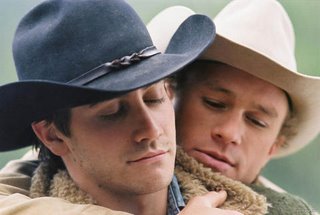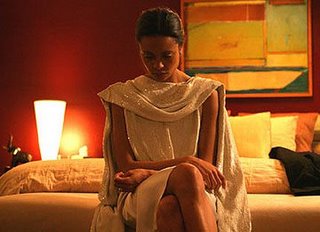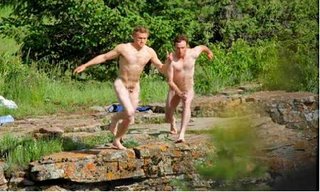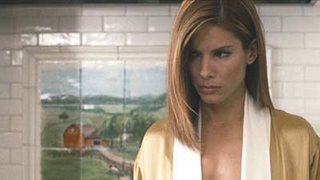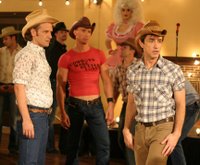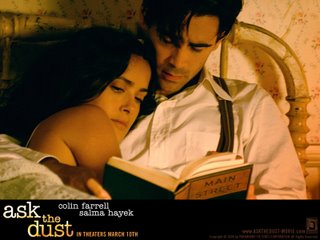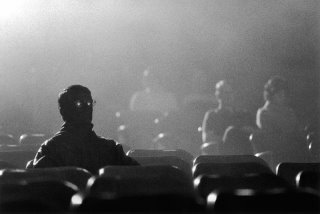
Hello again. Dang, it's been so long since my last post. What a bad, bad blogger I've been lately, huh? I'll post another update soon (promise), but for now, I want to get on to something
very important... Oscar Predictions! Yep, folks, since it's just about that time again. Time when film fanatics get antsy, offices hold Oscar pools and Hollywood pats itself on the back for all the good work they've done (and hey, why not?). This year's Oscars promise to be one of the more interesting races in recent years, especially with the depth of talent that is nominated. Indie films seem to be the most represented of the nominees, with nods to
Brokeback Mountain (Focus Features),
Capote (Sony Pictures Classics),
Crash (Lion's Gate) and
Good Night, and Good Luck (Warner Independent Films). And with gay or gay-themed films represented in all the top categories, the 2006 Oscars could be a major victory for the gay community. I'm placing my bets on the following nominees to walk off the winners. See if any of these match your picks, and post your comments. Looking forward to seeing what you have to say.
Without further ado, here we go...
KEN'S 2006 OSCAR PREDICTIONSBEST PICTURE: BROKEBACK MOUNTAIN
Having seen all the picture nominees, and having liked all of them to
some degree, I have to go with
Brokeback Mountain, not only b/cuz it is, at the moment, possibly the most culturally significant of the bunch (after that landslide defeat of gay marriage initiatives in those 2004 elections, an old-fashioned Hollywood love story about two men whose love for each other is devastated by homophobia is a subtle but powerful way to give the finger to bigots across the country), but b/cuz it is the most understated, eloquent and simply beautiful of the bunch.
Good Night, And Good Luck was, to me, too sparse, too simple, too small.
Capote was more of an actor's movie than it was a story movie.
Munich was good, but just didn't hit all the right notes. And
Crash, as much as I loved it and its message, was just a tad bit overwrought for my tastes in its well-intended but often manipulative depiction of race relations in the big city, and I think that might work against its chances.
Brokeback, on the other hand, with its simple, elegiac narrative and uniformly understated performances, was the most haunting--and also the most profound--of the nominees. Add to that the wealth of critical accolades being tossed at the movie, and I think it's a safe bet to say that, this year, Hollywood is "going gay." (And really, it's about f#cking time. Haha)
BEST DIRECTOR: ANG LEE
Though I thought
Steven Spielberg did a superb job with
Munich (I love the
very 1970s feel the movie had, not only in the costumes and settings, but in the film's relatively languid pacing, which reminded me of
The China Syndrome and
All the President's Men), I don't think
Munich is showy enough for him to win the Oscar. That leaves
Paul Haggis,
Bennett Miller,
George Clooney and
Ang Lee.
Good Night, And Good Luck will most likely be shut out of all the categories it is nominated in (i's just too small a film by Academy-standards to win an Oscar for anything major), and
Capote isn't as lofty as most Oscar-winning films usually are. In another year, Paul Haggis might have walked off for managing several interweaving storylines in
Crash, but there is simply no beating Ang Lee, who not only delivered the year's most genuinely heartbreaking love story, but he wrestled the finest performances of the year out of his cast.
BEST ACTOR: PHILIP SEYMOUR HOFFMAN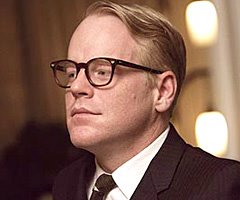
My personal favorite is
Heath Ledger, not only b/cuz his portrayal of a straight cowboy (truly, I don't think his character is really "gay") in love with another man is a show-stopping marvel of explosive longing, but also b/cuz he's one of only 2 men nominated in this category that created a role out of scratch. But the Academy loves anything showy, which means that
Philip Seymour Hoffman's tour de force as Truman Capote will walk away the winner. Which means that
Terrence Howard (a wonder in the brilliant
Hustle & Flow),
Joaquin Phoenix (damn good, but the movie was just so-so) and
David Strathairn (exceptionally good, but
Good Night's smallness is working against him) will have to be content just clapping along with Ledger as Hoffman makes another acceptance speech. On the bright side, this means that 3 out of 4 of the awards in the top categories will go to a gay-themed project.
BEST ACTRESS: REESE WITHERSPOON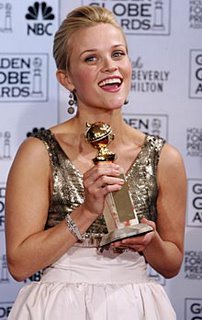
OK, let's talk the losers.
Keira Knightley is luminescent in
Pride & Prejudice, but at 20, she will have plenty of chances ahead of her. Apart from that, she's up against some powerhouse talent, namely
Judi Dench (who, many have said, simply "phoned it in" for
Mrs. Henderson Presents),
Charlize Theron (who already won for her
other ugly-woman role in
Monster), and front-runners
Felicity Huffman and
Reese Witherspoon. Though Huffman
deserves the award for not only her woman-as-a-man-becoming-a-woman tour de force in
Transamerica but also for all the years this brilliant actress has been overlooked by TV and movies, I think that Witherspoon will be the lone major win for
Walk the Line. Let's face it: she's American's Sweetheart (aka box office gold) right now, and the Academy just may feel compelled to make sure they hand out a statuette to at least
one movie nominated in the major categories that was a bona-fide hit.
BEST SUPPORTING ACTOR: GEORGE CLOONEY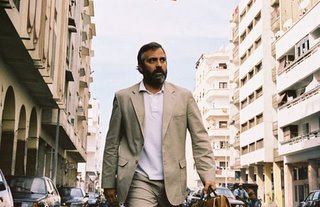
I have to say, I was very glad to see
Jake Gyllenhaal recognized in this category. Though much of the acting praise for
Brokeback has been heaped upon Heath Ledger, Gyllenhaal is really the glue that holds the movie together. His puppy-dog-in-love performance simply wreaks of vulnerability and ruffian charm, but I think he will be dismissed as just playing "second fiddle" to his co-star. That leaves
Matt Dillon,
Paul Giamatti,
William Hurt and
George Clooney. Though Dillon deserves major kudos for once again playing against type as the sadistic cop in
Crash, he's not the type of actor that usually finds himself up for Oscar awards. And as unfair as this might be to say, I think that will work against him. He's
Matt Dillon, the guy from
Little Darlings and
The Outsiders. Teen hunk getting older. I don't know that people take him that seriously. William Hurt, on the other hand, is an Oscar vet, having won for
Kiss of the Spider Woman and been nominated two other times. But his work in
A History of Violence amounts to just 10 minutes of screen time. Paul Giamatti has
finally been recognized by the Academy, after having been shut out the last two years in a row. But this year, he'll just have to be happy that they thought of him at all. Which means that George Clooney, who actually put on lots of weight and got himself admitted to the hospital for his role in
Syriana, will hopefully be keeping us in stitches with another hilarious acceptance speech. If he can top the one he gave at the Globes, I'd be all too happy.
BEST SUPPORTING ACTRESS: RACHEL WEISZ
This is one of the times where the phrase "Yeah, but she won the Golden Globe" comes in handy. I would
love to see
Michelle Williams awarded for her stunning, implosive performance as a wife wronged in
Brokeback Mountain, but people may still hold
Dawson's Creek against her.
Amy Adams was a surprise nomination, and she gave a delightful performance, but
Junebug was a difficult and loopy movie that not many people saw.
Catherine Keener, I felt was just a little dull as Harper Lee in
Capote, which brushed her aside far too often in favor of Hoffman.
Frances McDormand was great (as always) in
North Country, but I think that the role was actually too small, not to mention the fact that she was, um, mining familiar territory (a la
Fargo), and I doubt she'll be awarded for doing so this time around. Which means that
Rachel Weisz, who won the Globe for her turn as a daring activist in
The Constant Gardener (and whose character's death ignited that film with much of its suspsene) will probably have another speech to deliver come Oscar night.
BEST ADAPTED SCREENPLAY: BROKEBACK MOUNTAIN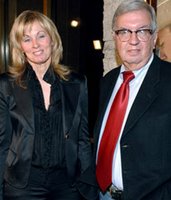
Quickly, b/cuz I'm starting to get tired of typing and I've got things to do: While
The Constant Gardener and
A History of Violence both broke free of the page-to-screen stereotypes that often plague adaptations of books, I don't see them as being weighty enough to snag this award.
Munich was, in my opinion, simply too old-fashioned for today's times, and
Capote was more of a character study than it was a truly great story. Which leaves
Brokeback. And let's face it: Turning a 53-page novella into a powerhouse love story that clocks in at over 2 hours is the very definition of adaptation.
BEST ORIGINAL SCREEPLAY: CRASH The Squid and the Whale
The Squid and the Whale: brilliant movie (I loved it), but far too small by Oscar standards.
Good Night, And Good Luck: Apart from Ben Affleck and Matt Damon, how often do actors (in this case, George Clooney) win Oscar awards for
writing?
Match Point: Woody Allen's best in years, but the story is more like a BBC mystery than the feature film it was turned into (and, to me, it shows in the finished product).
Syriana: Perhaps a bit
too bogged down in politics. Which means that Paul Haggis'
Crash, which works several storylines into one mammoth whole, should be the winner among this lot.
OTHER RACES:BEST ART DIRECTION: MEMOIRS OF A GEISHAPlease, did you
see how beautiful this movie looked?
BEST CINEMATOGRAPHY: BROKEBACK MOUNTAINGeisha is too easy a win. Besides, it's all costumes and art
direction for that one.
Brokeback is the most luminously beautiful
of the bunch.
BEST FILM EDITING: CRASHSorry, gotta go with the one with the most storylines tied together.
I never once got lost during the film.
BEST ORIGINAL SCORE: MEMOIRS OF A GEISHASure, I love the music in
Brokeback, but John Williams is an Oscar
giant. With
two nods this year, I think he'll score (har! har!) for
the authentic
Geisha score.
BEST ORIGINAL SONG: "IN THE DEEP" FROM CRASHI
want Dolly Parton to win, and I
loved "It's Hard Out Here for a
Pimp," but Eminem's win for "Lose It" from
8 Mile may have been a fluke for rap songs, and Parton's tune might be a bit too simplistic for the academy.
In the Deep is the kind of emotionally rousing show-stopper of the bunch.
BEST VISUAL EFFECTS: KING KONGAs if there were
any other choice.
BEST SOUND EDITING: KING KONGDitto.
BEST SOUND MIXING: KING KONGThough
Ray won in this category last year, I'm sticking with
Kongin a two-for-two win in the sound categories.
BEST COSTUME DESIGN: MEMOIRS OF A GEISHACharlie & the Chocolate Factory was a joy to look at, but Colleen
Atwood is already a winner (for
Chicago), and Hollywood is a sucker
for Asian design, so I'm going with
Geisha to, er, wear the pants in
this family of nominees.
BEST MAKEUP: CHRONICLES OF NARNIACinderella Man doesn't stand a chance in this one. So it's
between
Star Wars Episode 3: The Revenge of the Sith and
The
Chronicles of Narnia. Though most are predicting that
Narnia will
be the winner in this category, I would't be surprised if the Academy gave the the
Lord of the Rings/"end of the trilogy" award to
Sith.
BEST FOREIGN LANGUAGE FILM: TOTSIIt's the only one I know anything about. :)
BEST ANIMATED FEATURE: WALLACE & GROMIT: CURSE OF THE WERE-RABBITWith 3 prior wins for their
W&G shorts, expect Nick Park to snag a
fourth for their feature film debut. Besides, it was a true treat for
all.
BEST ANIMATED SHORT: 9Some might think that Pixar will again dominate (for
One Man Band),
but I'm thiking that
9 might take it for being the most
interestingof the bunch. A suspense yarn as a kids' tale? I'm down with that!
BEST DOCUMENTARY FEATURE: MARCH OF THE PENGUINSWhen all else fails, go with the Box Office winner! :)
BEST DOCUMENTARY SHORT: GOD SLEEPS IN RWANDASome have predicted
The Death of Kevin Carter to be the winner
here, but I must admit: I love the title of
God Sleeps in Rwanda. I
mean, it just
sounds like an Oscar winner, doesn't it? :)
BEST LIVE ACTION SHORT: AUSREISSERIt's German, it's pretty out there, and it's about a creepy kid. It's
got my vote.
***********************************************
OK, folks, there you have it. My votes for this year's Oscar wins.
Coincidentally, they are very much in line with the predictions
in
Entertainment Weekly this year. Hey, I think I might just be on
to something! :)
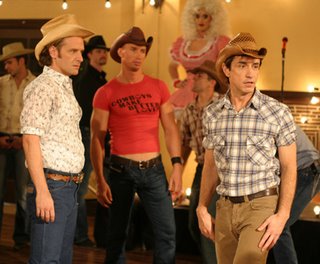 Actor-writer-director Craig Chester’s gay romantic comedy Adam & Steve is not a perfect film, but at least it avoids the stale clichés that often litter most of today’s self-consciously gay-themed entertainment. In this light and breezy romp through (what else?) the trials of the heart, Chester (Swoon, Grief) stars as Adam, a single man who, when we first meet him, is a Robert Smith-idolizing Goth with the requisite bad hair and eye makeup who spends most of his time hanging out in clubs with the requisitely overweight fag hag Rhonda (Parker Posey in a hysterical fat suit). When he meets go-go boy Steve (Malcolm Gets, looking much buffer than I remember him on Caroline in the City), the encounter – which includes copious amounts of coke laced, um, with baby laxatives – inevitably ends in disaster, and the two part ways never to see each other again. Or so they think. Cut to 17 years later, when Adam and Steve unexpectedly reunite after Adam almost kills his dog (don’t ask) and rushes the poor pooch into the hospital where Steve, now a successful doctor, works. Not recognizing each other from their previous encounter, they eventually wind up in a relationship that is, of course, doomed by the inevitable realization that is to come. It’s a clever setup, and one that is informed by Chester’s obvious fondness for the romantic comedy genre, even if his somewhat lackadaisical style as a director occasionally clashes with the more outrageous tone of his slapstick-inspired script. Still, it’s a fun ride. Buoyed by the engaging performances of the ensemble cast (SNL vet Chris Kattan is particularly riotous as Steve’s straight roommate Michael) and benefiting from Chester’s confident, no-guilt approach to an otherwise formulaic genre, Adam & Steve may not be the ultimate date movie, but that’s certainly no reason not to embrace a film that is this un-self-conscious about being exactly what it is. That’s not a bad lesson for the entire gay community, come to think of it. Grade: B. --Originally published in IN Los Angeles Magazine.
Actor-writer-director Craig Chester’s gay romantic comedy Adam & Steve is not a perfect film, but at least it avoids the stale clichés that often litter most of today’s self-consciously gay-themed entertainment. In this light and breezy romp through (what else?) the trials of the heart, Chester (Swoon, Grief) stars as Adam, a single man who, when we first meet him, is a Robert Smith-idolizing Goth with the requisite bad hair and eye makeup who spends most of his time hanging out in clubs with the requisitely overweight fag hag Rhonda (Parker Posey in a hysterical fat suit). When he meets go-go boy Steve (Malcolm Gets, looking much buffer than I remember him on Caroline in the City), the encounter – which includes copious amounts of coke laced, um, with baby laxatives – inevitably ends in disaster, and the two part ways never to see each other again. Or so they think. Cut to 17 years later, when Adam and Steve unexpectedly reunite after Adam almost kills his dog (don’t ask) and rushes the poor pooch into the hospital where Steve, now a successful doctor, works. Not recognizing each other from their previous encounter, they eventually wind up in a relationship that is, of course, doomed by the inevitable realization that is to come. It’s a clever setup, and one that is informed by Chester’s obvious fondness for the romantic comedy genre, even if his somewhat lackadaisical style as a director occasionally clashes with the more outrageous tone of his slapstick-inspired script. Still, it’s a fun ride. Buoyed by the engaging performances of the ensemble cast (SNL vet Chris Kattan is particularly riotous as Steve’s straight roommate Michael) and benefiting from Chester’s confident, no-guilt approach to an otherwise formulaic genre, Adam & Steve may not be the ultimate date movie, but that’s certainly no reason not to embrace a film that is this un-self-conscious about being exactly what it is. That’s not a bad lesson for the entire gay community, come to think of it. Grade: B. --Originally published in IN Los Angeles Magazine.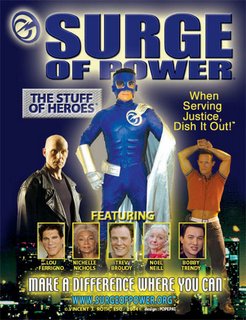 For those who’d always fantasized that Spider-man had been bitten by a radioactive spider that was part of an experiment on, say, the origins of sexual orientation, Mike Donahue’s decidedly kitschy gay superhero flick Surge of Power just might be the movie for you. Or not. As a bona fide superhero fan myself (I’m a sucker for a man in a codpiece and colorful tights), I’d like to report that Donahue’s indie comedy redefines action hero stories for a contemporary gay audience. But, rather than send up the genre (as one might have hoped any creative queen with a camera might do), Donahue merely tweaks it to include a surprisingly outdated gay sensibility. Working with a woefully limited budget and a cast of “actors” (I use the term very loosely) who appear to have never even heard of acting class, Donahue gleefully follows all the conventions of superhero origins without giving them a truly fresh spin: Comic book fanatic Gavin (Vincent J. Roth, who also wrote, produced, and designed costumes for the film) acquires odd electrical powers after an egomaniacal science queen named Hector (John T. Venturini) with delusions of grandeur and an overly gym-pumped body causes an explosion in a scientist’s laboratory, then sets about saving the world while romancing the pants off the badly dressed circuit queen he saved from a potential fag bashing. The script is supposed to be witty (a la Scream, characters frequently comment upon the superhero conventions applied throughout the film; Surge’s one superhero weakness is—wait for it—dance music), but the dialogue is so embarrassingly cringe-worthy (“Wait’ll the city gets a load of my magnetic personality!” seethes the magnetically powered Hector) and the acting so awkward (honestly, I’ve seen better work in porn flicks) that most of the “jokes” just fall flat with a resounding Pow! Even a series of D-grade celebrity cameos (hey, there’s Lou Ferrigno ordering a copy of a gay comic book!) can’t buoy the film’s spirits. Still, I wouldn’t be surprised if this so-bad-it’s-actually-unintentionally-hysterical stinker wound up becoming a gay cult classic. At least the midnight costume screenings would be a riot! Grade: D. -- Originally published in IN Los Angeles Magazine.
For those who’d always fantasized that Spider-man had been bitten by a radioactive spider that was part of an experiment on, say, the origins of sexual orientation, Mike Donahue’s decidedly kitschy gay superhero flick Surge of Power just might be the movie for you. Or not. As a bona fide superhero fan myself (I’m a sucker for a man in a codpiece and colorful tights), I’d like to report that Donahue’s indie comedy redefines action hero stories for a contemporary gay audience. But, rather than send up the genre (as one might have hoped any creative queen with a camera might do), Donahue merely tweaks it to include a surprisingly outdated gay sensibility. Working with a woefully limited budget and a cast of “actors” (I use the term very loosely) who appear to have never even heard of acting class, Donahue gleefully follows all the conventions of superhero origins without giving them a truly fresh spin: Comic book fanatic Gavin (Vincent J. Roth, who also wrote, produced, and designed costumes for the film) acquires odd electrical powers after an egomaniacal science queen named Hector (John T. Venturini) with delusions of grandeur and an overly gym-pumped body causes an explosion in a scientist’s laboratory, then sets about saving the world while romancing the pants off the badly dressed circuit queen he saved from a potential fag bashing. The script is supposed to be witty (a la Scream, characters frequently comment upon the superhero conventions applied throughout the film; Surge’s one superhero weakness is—wait for it—dance music), but the dialogue is so embarrassingly cringe-worthy (“Wait’ll the city gets a load of my magnetic personality!” seethes the magnetically powered Hector) and the acting so awkward (honestly, I’ve seen better work in porn flicks) that most of the “jokes” just fall flat with a resounding Pow! Even a series of D-grade celebrity cameos (hey, there’s Lou Ferrigno ordering a copy of a gay comic book!) can’t buoy the film’s spirits. Still, I wouldn’t be surprised if this so-bad-it’s-actually-unintentionally-hysterical stinker wound up becoming a gay cult classic. At least the midnight costume screenings would be a riot! Grade: D. -- Originally published in IN Los Angeles Magazine.



